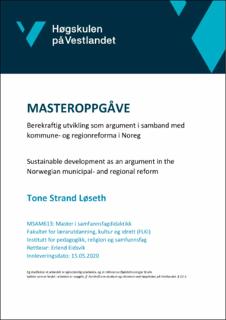| dc.description.abstract | Due to the serious situation in the world, sustainable development is the main subject of this master thesis. The world is changing, and the popularity of the term sustainable development has increased. However, sustainable development is not just about taking care of the climate and the environment. As this master thesis will show – sustainable development is just as much about economic development and social justice. Therefore, it is important to find a balance between these three dimensions.
There are several ways our society can contribute to find this balance to secure a sustainable development. In Norway, the government has initiated a local government reform to seek a more sustainable society. The result of this reform has been a reduction from 428 municipalities to 356, as well as a reduction from 19 to 11 counties in the country from 01.01.2020.
The reductions have now been implemented and Norwegians all over the country are living in new municipalities and counties, but in what way have politicians argued that this change will be sustainable for the country? This master thesis will aim to answer this and therefore the research question is: In what way and to what extent is the term sustainable development used as an argument for implementing municipal- and regional reform in Norway from 2014 to 2020?
Hence, the research approaches applied in this thesis are discourse analysis and an interview analysis, both with great inspiration from Gordon Waitt. The research shows that all seven documents that have been analysed and all the nine informants argue that the local government reform will mainly contribute to the local economy in the municipalities and in the regions. Therefore, they argue if larger units in fact will ensure a stronger and safer economy that will benefit the residents since, for example, one can improve public services. As a result of these arguments, it is safe to say that the politicians who works with the local government reform is using the economy- and the social justice dimension of sustainable
development to argue their opinions. However, as the thesis will show, it is important to identify who has the power to impart knowledge and how this power is used to persuade? The thesis will show us how easy it can be to silence various discourses and to exclude contradictory arguments in a political debate. | en_US |

